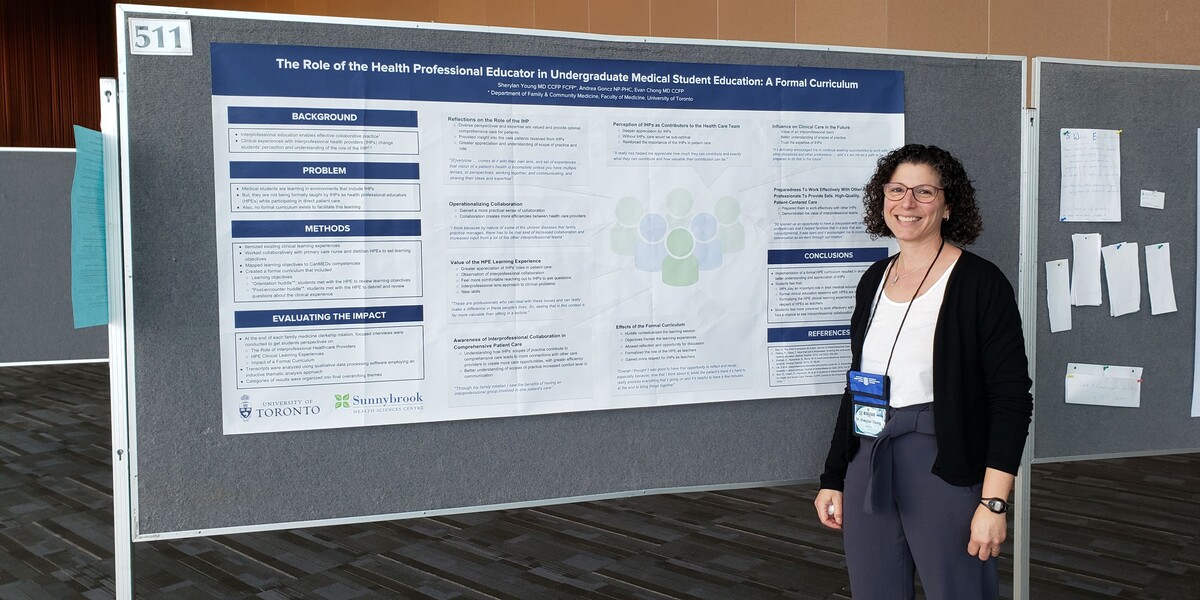The OES is here to help you with your AOP application!
These two-year grants can provide up to $5,000 per project.

These two-year grants can provide up to $5,000 per project.
The uniqueness of our discipline lies in its focus of application. It is the academic study of the art of the possible…Dr. Fred Fallis, former DFCM Chair
The Art of the Possible (AOP) Education Scholarship Grant Program, offered by the Office of Education Scholarship (OES), provides seed grants to support education scholarship projects that will benefit one of the DFCM programs or divisions (Undergraduate Education, Postgraduate Education, Graduate Studies, Faculty Development, Quality Improvement, Global Health, Emergency Medicine, Palliative Care, Care of the Elderly, Mental Health & Addiction, Clinical Public Health, Hospital Medicine).
This is an ideal opportunity for faculty members who are new to education scholarship. This program is designed to support applicants from idea to dissemination, providing consultations, faculty development events, and application writing support. This program requires program director/division head approval before applications are moved forward for adjudication. These two-year grants can provide up to $5,000 per project.
The OES is here to help you with your AOP application. We can provide consultations as you formulate your idea, or at any stage of the process. If you are thinking about applying, request a virtual chat to help you get started, or a more in-depth consultation – email dfcm.education@utoronto.ca .
If you have questions about the application process, please contact the OES at dfcm.edscholarship@utoronto.ca.
Examples of possible projects based on Boyer’s categories of education scholarship*:
*Boyer EL. Scholarship Reconsidered: Priorities of the Professoriate. Princeton University Press, 3175 Princeton Pike, Lawrenceville, NJ 08648;1990 Dec 3.
Principal Investigator/Co-Principal Investigator:
Collaborator:
Senior Advisor:
February 17, 2026, 11:59 pm - Deadline for submission of draft application
April 10, 2026, 11:59 pm - FINAL application is due.
End of May - After adjudication by the DFCM Education Grant Committee, applicants will receive decision letters.
If you have applied for research ethics approval through your hospital research ethics board, you may be required to complete a data transfer agreement before your research assistant can begin work. This will depend on your hospital’s policies, and how your RA was hired. Please check with your hospital research ethics board to learn how their policies may affect your project. For ease of access of funds, it is recommended that you administer the grant, including primary research ethics approval, research assistant hiring, and other expenses/activities, through the University of Toronto. You may still require additional ethics approval from your local site but the primary approver is recommended to be the University of Toronto Research Ethics Board.
| Program/Division | Request support from | |
|---|---|---|
|
Undergraduate Education |
Dr. Azi Moaveni |
|
|
Postgraduate Education |
Dr. Stuart Murdoch |
|
|
Graduate Studies |
Dr. Abbas Ghavam-Rassoul |
|
|
Faculty Development |
Dr. Allyson Merbaum |
|
|
Global Health |
Dr. Praseedha Janakiram |
|
|
Quality Improvement |
Dr. Tara Kiran |
|
|
Physician Assistant Program |
Dr. Peter Tzakas |
|
|
Palliative Care |
Dr. Kirsten Wentlandt |
|
|
Emergency Medicine |
Dr. Megan Landes |
|
|
Care of the Elderly |
Dr. Sid Feldman |
|
|
Mental Health & Addictions |
Dr. Nikki Bozinoff |
|
|
Clinical Public Health |
Dr. Ross Upshur |
|
|
Hospital Medicine |
Dr. Hedieh Molla Ghanbari |
| Date | Project Lead(s) | Site | Project Title |
|---|---|---|---|
|
2024-27 |
Christopher Gilchrist (PI) |
Trillium |
Assessing the Impact of a Novel Auscultation eModule on Medical Student Learning Outcomes: A Two‐Year Cohort Study |
|
2024-27 |
Neal Belluzzo (Co-PI), Priya Sood (Co-PI) |
Humber River Health |
What are the barriers and facilitators for community‐based family physicians to act as undergraduate medical supervisors in the post‐pandemic context? |
|
2024-27 |
Lindsay Herzog |
Mt. Sinai Hospital |
Exploring the Physical Space in Family Medicine Clinical Supervision |
|
2024-27 |
Alis Xu (Co-PI), Lina Al-Imari (Co-PI) |
Southlake Regional Hospital |
Why They Stay: Factors that Attract and Retain Family Physicians |
|
2024-27 |
Muna Al-Khaifi (Co-PI), Sarah Kim (Co-PI |
Sunnybrook HSC |
Through Their Eyes: A Breast Cancer Survivor‐led Art Workshop for Undergraduate Medical Students |
| 2024-27 | Rami Shoucri (Co-Pi), Melanie Henry (Co-PI) | St. Michael's Hospital | Developing and Evaluating an Innovative Post‐Graduate Medical Education (PGME) Curriculum to support residents in identifying and addressing low‐income patients’ “Health Harming Legal Needs” |
| 2024-27 | Melissa Graham (Co-PI), Abbas Ghavam-Rassoul (Co-PI) | Credit Valley | Improving our Academic Fellowship & Graduate Studies Program through Targeted Innovation: A Scholarly Program Evaluation |
| 2024-27 | Kirsten Wentlandt (PI) | Toronto General | Palliative Care education for nurses, occupation therapists, physical therapists, midwives, and social workers: A systematic review of the evidence, models, format, content and outcomes |
| 2024-27 | Nikki Bozinoff (Co-PI), Sarah Whynot (Co-PI) | CAMH | What happens after graduation? Exploring enhanced skills in addiction medicine graduates' career trajectories and perceived optimal practice models. |
| 2024-27 | Jackie Bellaire (Co-PI), Lindsay Herzog (Co-PI) | Michael Garron | A Critical Evaluation of a Poverty and Health Family Medicine Residency Workshop informed by Transformative Education |
| 2024-27 | Alissa Tedesco (Co-PI), Naheed Dosani (Co-PI) | Mt. Sinai | Working Towards Transformation: Exploring the impact of a rotation in equity‐oriented palliative care on physicians’ perspectives and practices |
| 2024-27 | Sarah Gedleh (Co-PI), Nina Yashpal (Co-PI) | Credit Valley | Implementation and Evaluation of a Home/Long Term Care Elective in a Post Graduate Family Medicine Residency Program |
| 2024-27 | Shelly-Anne Li (PI) | Toronto Western | Practicing Empathetic Conversations: Enhancing Patient‐Centered Care for BIPOC Groups through Forum Theatre |
Find a complete archive of Art of the Possible projects listed by DFCM program.
